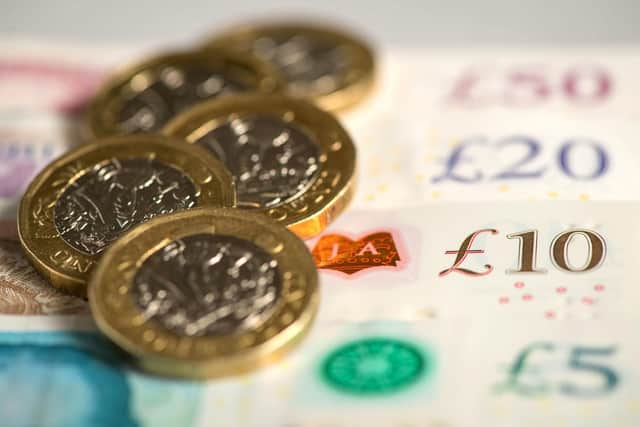UK recession what does it mean: What is a recession? What happens in a recession?
Britain’s economy officially slipped into a recession at the end of 2023 after output contracted by more than expected in the final three months, official figures have confirmed.
The Office for National Statistics (ONS) estimated that gross domestic product (GDP) fell by a worse-than-expected 0.3 per cent between October and December, following a decline of 0.1 per cent in the previous three months.
Advertisement
Hide AdAdvertisement
Hide AdIt means Rishi Sunak’s pledge to grow the economy has been dealt a hammer blow, with Labour's shadow chancellor Rachel Reeves saying the Prime Minister's commitment has been left “in tatters”.
But what happens with a recession, and what could it mean for people in Scotland. Here's what you need to know.
What is a recession?
In the UK, a recession is defined as a negative economic growth in gross domestic product (GDP) for two consecutive quarters. In Q3 of last year – July to September – a fall of 0.1 per cent was recorded, followed by a 0.3 per cent reduction in Q4 (October to December), which qualifies as a recession.
The last time the UK entered recession was in 2020 during the Covid pandemic when large parts of the economy had to be shut down. However, the UK has teetered on the brink of recession in recent years amid soaring inflation, the war in Ukraine and the cost-of-living crisis.


What happens in a recession? What does a recession mean for me?
Recessions generally happen when there is a widespread drop in spending (an adverse demand shock). This may be triggered by various events, such as a financial crisis, an external trade shock, an adverse supply shock, the bursting of an economic bubble, or a large-scale anthropogenic or natural disaster, like a pandemic.
During a recession, there is in plan terms less money circulating. This means less money is being spent in shops and restaurants, and the government is receiving less money in tax from wages, which it uses in turn to pay for public services and benefits.
A number of negative effects may be felt as a result. The economy will struggle, people may lose work as companies make fewer sales and their profit margins get smaller. Overall, the country's overall economic output declines and can even affect other countries that have strong trade links or are affected by similar issues.
Employers will typically look to make savings during a recession, meaning people may find it harder to find work or get a pay rise. Banks also often tighten their lending criteria, making it harder to get a mortgage or loan during a recession, although higher interest rates in 2024 may offset this to a degree. One positive for home owners is that confirmation of a recession will place extra pressure on the Bank of England to trigger an interest rate cut.
What has been said about the latest UK recession?
Advertisement
Hide AdAdvertisement
Hide AdThere have been early forecasts by economists the recession will likely be short-lived, with GDP expected to pick up from the start of 2024.
Barret Kupelian, chief economist at PricewaterhouseCoopers (PwC) UK, said while the UK is in a technical recession, it would likely not be long-lasting or deep.
He said: “We expect this episode to be one of the shallowest recessions of modern times, as it does not reflect a sharp and protracted downturn in response to a specific set of adverse economic circumstances.
“Business activity picked up significantly in the beginning of the year, which should translate to better real economic data.”
Economist Samuel Tombs, from Pantheon Macroeconomics, said: “It’s overly dramatic to label the decline in economic activity in the second half of 2023 a recession, given that employment continued to rise, real wages rebounded and measures of business and consumer confidence returned to levels consistent with rising activity by the end of the year.”
He said there was also a good chance that revisions to economic data by the Office for National Statistics (ONS) may see the recession avoided in the end.
He said: “We expect quarter-on-quarter growth in gross domestic product to average 0.3 per cent in 2024, driven by a pick-up in households’ real expenditure.
“The [Bank of England’s] Monetary Policy Committee, therefore, needn’t panic that the economy weakened at the end of last year and can proceed with its plans to cut Bank Rate only gradually this year.”
Advertisement
Hide AdAdvertisement
Hide AdHowever, James Smith, research director at the Resolution Foundation, said: “Britain has fallen into recession, and a far deeper living standards downturn. Even this weak data is flattered by a rising population.
“After accounting for population growth, the UK economy hasn’t grown since early 2022, and fallen far behind its pre-cost-of-living crisis path, with an equivalent loss of around £1,500 per person.
“The big picture is that Britain remains a stagnation nation, and that there are precious few signs of a recovery that will get the economy out of it.”
Chancellor Jeremy Hunt told broadcasters: “We always expected growth to be weaker while we prioritised tackling inflation, that means higher interest rates, and that is the right thing to do because you can’t have long-term healthy growth with high inflation.
“The underlying picture here is an economy that is more resilient than most people predicted, inflation is coming down, real wages have been going up now for six months.
“If we stick to our guns, independent forecasters say that by the early summer we could start to see interest rates falling and that will be a very important relief for families with mortgages.”
Additional reporting by PA.
Comments
Want to join the conversation? Please or to comment on this article.
